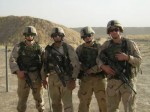The US Army is assessing ways to increase soldier resilience. The goal is to help soldiers become more physically and mentally fit, so that when they experience traumatic events, the impact will not be as severe and they will be better equipped to mentally manage the traumatic experience. Army Brig. Gen. (Dr.) Rhonda Cornum is director of the Army’s Comprehensive Soldier Fitness program. She believes that the new program will help soldiers to increase their resilience physically, emotionally, socially, spiritually, plus, in addition, have a healthier family life.
Positive Psychology is playing a role in supporting soldier resilience. Currently, 1.1 million soldiers are scheduled to be trained in positive psychology techniques to improve their emotional resilience. At the University of Pennsylvania, sergeants are being trained to help soldiers learn how to be optimistic, combat catastrophic thoughts, use their strengths and increase effective social communication. The goal is that this will increase the performance and resilience of soldiers and decrease depression and anxiety.
How will this help army soldiers? The unrest in the Middle East necessitates a need for solders to frequently be deployed overseas for a year and then back home for a year, before going overseas again. Army Chief of Staff Gen. George W. Casey Jr. stated that the frequent deployments cause mental stress for solders. Casey observed that while the army has programs in place for addressing the effects of trauma on solders after it occurs, very little to date has been done in the area of lessening the impact of traumatic experiences for solders.
One concept of Positive Psychology is that of Post-Traumatic Growth. The evidenced-based concept shows that when individuals do experience a high-stress or traumatic event they often experience growth afterward, leading to increased self-awareness, appreciation of life, inner strength and spiritual growth. Some solders experience Post Traumatic Stress Disorder (PTSD)after being in combat. Symptoms include nightmares, flashbacks, a heightened startle reflex and avoidance of anything associated with the traumatic experience. Casey noted that after soldiers are in combat not all experience Post Traumatic Stress Disorder. Many, Casey stated, experience Post Traumatic Growth. Casey believes that with Resilience Training solders will be less likely to experience Posttraumatic Stress Disorder, and more will experience growth.
Some, such as Guided Imagery expert Bellruth Naparstek, have criticized this move by the army of investing so much into the resilience training of soldiers. What is important to remember is that almost all therapies, including guided imagery, are based on treatment of PTSD, once it has occurred. Positive Psychology is being implemented as a prevention technique to reduce the occurrence of trauma and increase post-traumatic growth. The evidence that Positive Psychology can do this is very good. Kudos to the army for taking a stand and using preventative measures to improve the life-quality, and hopefully reduce the trauma, for the soldiers who risk their lives in combat.
Deborah Barnett, Ph.D.
Phone Coaching and Counseling for Business Success and Personal Thriving


Recent Comments